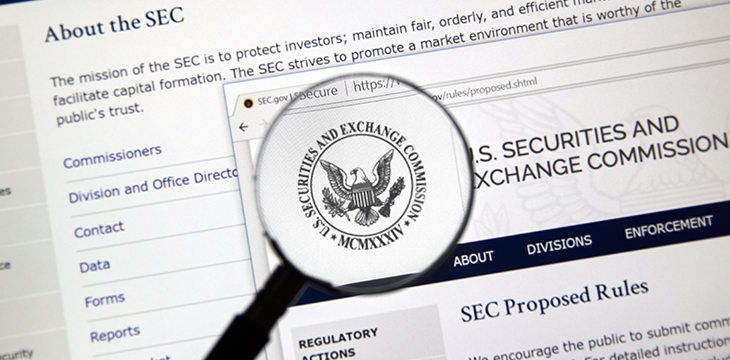
|
Getting your Trinity Audio player ready... |
The U.S. Securities and Exchange Commission (SEC) has signaled again that DeFi, or “decentralized finance” platforms aren’t immune from legal scrutiny. This week, it launched a civil investigation into Uniswap Labs, creators of the popular Uniswap DEX.
Uniswap is one of the oldest DEXs, or “decentralized exchanges” and is currently the largest. Running on Ethereum, it launched in November 2018 and has seen over US$10 billion in weekly trading volumes pass through its networks. The latest version of the DEX had an estimated volume of $39 billion in August, while its previous version that’s still active handled $14 billion worth of trades, CoinGecko data showed.
According to Wall Street Journal report, the SEC is looking into how Uniswap’s users trade on the platform, and its marketing. It suggests the cat-and-mouse game of digital asset trading avoiding local regulations is definitely being played by both sides. The marketing angle is important too, with regulators today scrutinizing the activities of investment promoters as keenly as they do the platforms themselves.
Uniswap (the exchange) is not the only platform that uses the Uniswap protocol. Since it’s open source, anyone may implement the code in other projects. As a result, several exchanges have launched (usually with “swap” in their names, such as SushiSwap) which may also end up competing against each other for liquidity and market share.
One of the rationales behind the creation of DeFi/DEXs is security—users retain custody of their own assets in local wallets, rather than transferring them to a centralized platform. This makes them less vulnerable to hot wallet attacks that have drained funds from multiple traditional digital asset exchanges over the years.
Another one is regulation. DeFi app developers create only software, and never take custody of users’ assets. This, in theory, immunizes them from certain legal obligations since they don’t issue or decide to list assets, and don’t have direct control over how their software code is used.
Both the above factors have contributed to DeFi’s rise in popularity and prominence over the past few years. Users provide the necessary liquidity to make the exchanges function by taking a share of fees. There’s no central decision-making body to decide which assets can be listed or not, and anyone can access the platforms—with no restrictions on users’ physical location or residency, and no requirement to use real identities or undergo KYC procedures.
These conditions would seem ideal to those who would like to see completely free, truly international markets for digital assets that exist outside any jurisdiction. But needless to say, it’s anathema to regulators looking to investigate money laundering activities or track proceeds of crime, and governments who have introduced ever-stricter rules for identifying asset traders and where all the money is going.
In other words, it’s unlikely that governments will allow DeFi platforms to grow large enough for large volumes of funds to pass through their networks unmonitored. The move to investigate Uniswap Labs may be a civil investigation or a friendly-faced fact-finding exercise, but it’s a signal the SEC and likely other regulators around the world are looking for new ways to exert authority over the individuals responsible for their existence.
As Dr. Craig Wright has said repeatedly, code is not law, governments will not tolerate attempts to skirt their laws for long, and behind all code projects there are humans writing the code. To regulate even the most decentralized of DEXs, regulators simply need to look for other pressure points—e.g., developers, fiat gateway providers (since DEXs can’t list or hold national currencies), token issuers and liquidity providers. Ultimately, humans and regulated entities must form part of the process, and governments have the power to limit or halt their activities.
The SEC and other regulators aren’t going to throw up their hands and say, “Looks like there’s nothing we can do here, oh well.”
Should DEX/DeFi enablers appear to be deliberately attempting to skirt regulations or indifferent to authority, or promoting their networks as unregulated to attract investors, regulators will surely take a heavy hand. Like the early days of online betting, operators that signaled willingness to cooperate were given warnings and treated leniently, while others who openly flaunted the rules went to jail.
There is nothing wrong with the concept of DeFi per se, and indeed many of them would run far better on BSV than Ethereum—where network congestion and high ETH “gas” fees have presented barriers to easy use. But even a faster, more efficient network doesn’t bestow immunity from human laws. Governments will always pay close attention to anyone, or any structure, that tries to avoid them.
Watch: SEC Commissioner Hester Peirce discusses “Blockchain Policy Matters” with Bitcoin Association’s Jimmy Nguyen
Recommended for you
Lorem ipsum odor amet, consectetuer adipiscing elit. Elit torquent maximus natoque viverra cursus maximus felis. Auctor commodo aliquet himenaeos fermentum
Lorem ipsum odor amet, consectetuer adipiscing elit. Accumsan mi at at semper libero pretium justo. Dictum parturient conubia turpis interdum

 11-22-2024
11-22-2024


